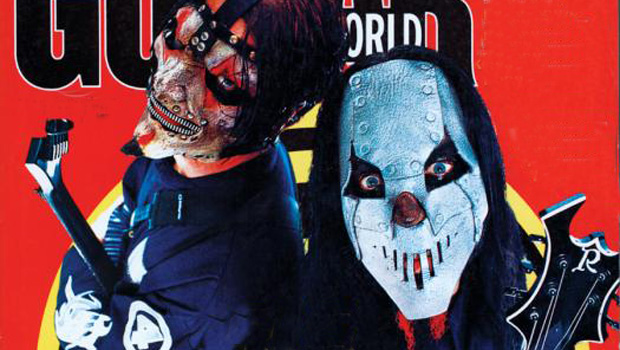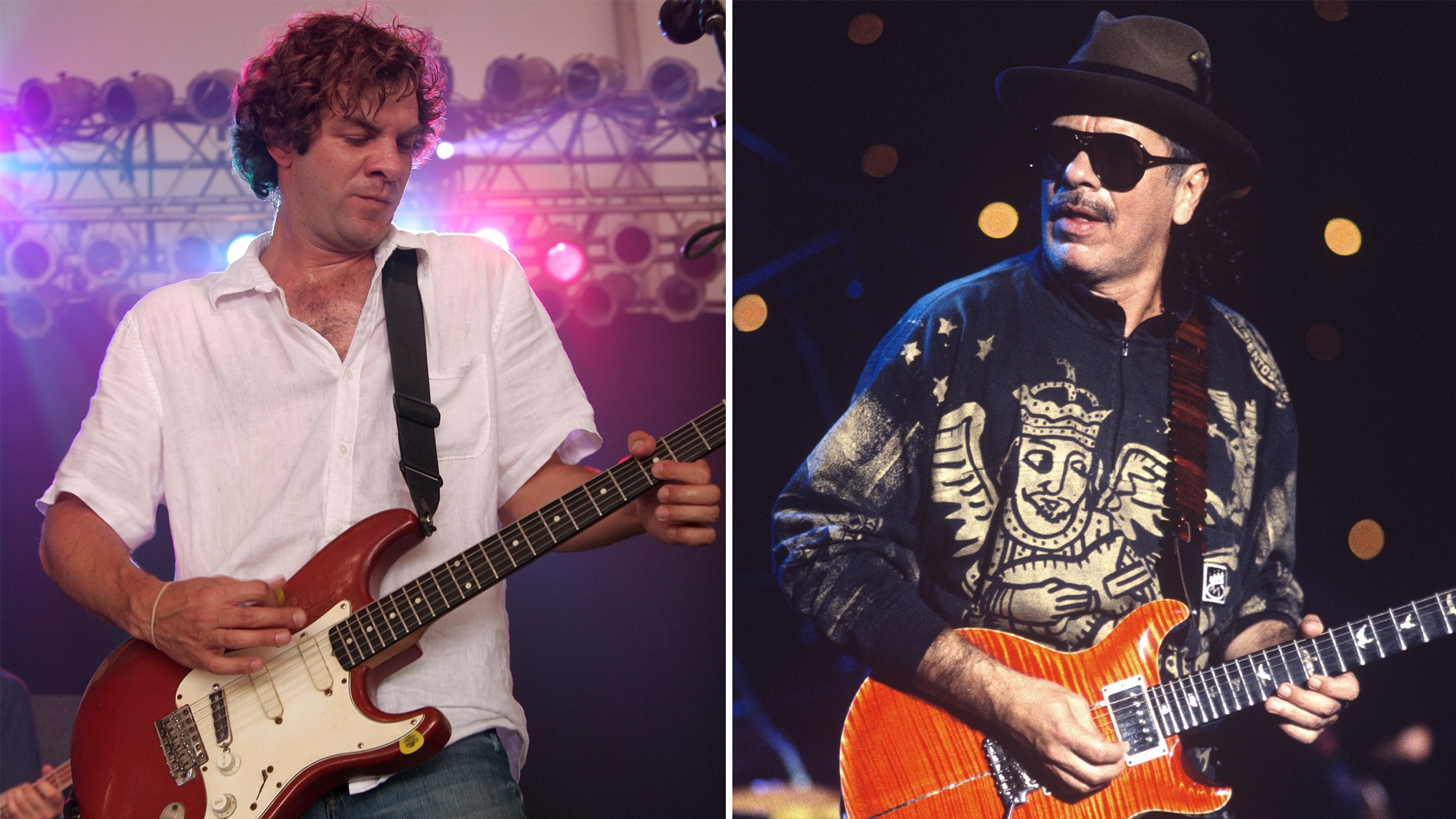Slipknot: "You can either evolve with us and get with it, or maybe you’re just not there yet, and maybe we’re not your band"
In this exclusive interview, Jim Root and Mick Thomson take you inside the making of We Are Not Your Kind
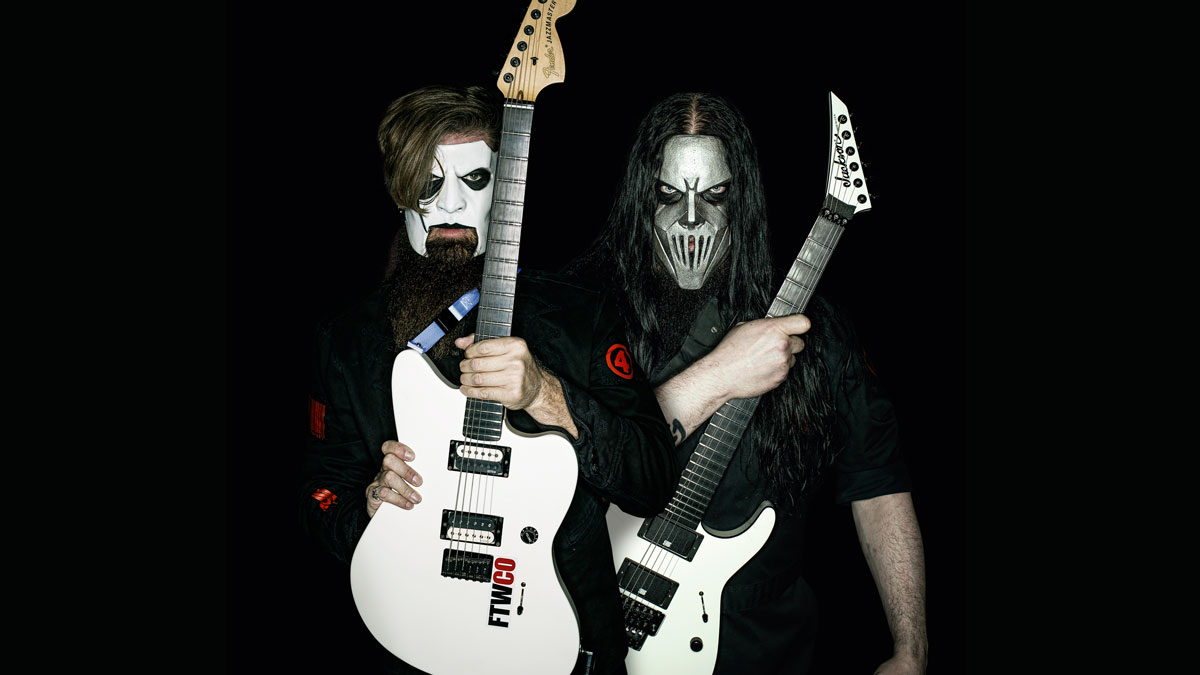
All the latest guitar news, interviews, lessons, reviews, deals and more, direct to your inbox!
You are now subscribed
Your newsletter sign-up was successful
It’s not too often that Slipknot release a new album - it’s been half a decade since the band’s last full-length, 2014’s .5: The Gray Chapter - but when they do, one thing you can be sure of is that it’ll be a unique experience in every way, from the music to the visuals to the outfits (new masks, anyone?) that go along with it.
“You can either evolve with us and get with it, or maybe you’re just not there yet, and maybe we’re not your band,” says guitarist Jim Root. “But we’re always going to do what we’re going to do.”
That ideology is clearly evident on the band’s newest and sixth full-length album, We Are Not Your Kind. The record finds Slipknot - which, in addition to Root, includes the core Des Moines, Iowa-bred unit of guitarist Mick Thomson, singer Corey Taylor, percussionist Shawn 'Clown' Crahan, keyboardist, and sampler Craig Jones and turntablist Sid Wilson, as well as newer additions drummer Jay Weinberg and bassist Alessandro Venturella (co-percussionist and original member Chris Fehn exited the band under acrimonious circumstances in March of this year, with his position filled by a so-far anonymous stand-in) - playing it as hard and fierce as ever.
For evidence, witness the positively crushing Birth Of The Cruel and the rampaging closer, Solway Firth), while the band also continue to push out on their sonic boundaries, as evidenced by tracks like the choir-assisted first single Unsainted, the eerie Spiders and Not Long For This World, and the hooky, major-key thrash anthem Nero Forte.
It’s a varied and intense ride, to be sure, and one that is all but guaranteed to please those Slipknot fans who, as Root said earlier, continue to evolve with the band. As for the others?
“It’ll be loved, it’ll be hated, but whatever,” Thomson says bluntly. “We’re certainly not for everybody. And if you don’t like it, I mean, who cares? We’re not interested in being all things to all people. We’re just trying to remain honest to ourselves.”
I’m still waiting for the time where we get to do a jazz set sitting on stools, maybe there’s a piano over off the side… keep things mellow
Mick Thomson
Prior to the release of We Are Not Your Kind, and just days before the kickoff of the band’s European tour - their first shows in almost three years - Root and Thomson sat down with Guitar World in Helsinki, Finland, to offer an exclusive look inside the making of the record. They also discussed new gear and new masks, and took a detailed trip back 20 years to their first-ever tour, as a second-stage act on the 1999 Ozzfest.
All the latest guitar news, interviews, lessons, reviews, deals and more, direct to your inbox!
As far as they’ve clearly come since those formative and, judging by their Ozzfest stories, rather foul days, the two guitarists also made it clear that Slipknot still have plenty left to accomplish.
“There’s a lot for us to achieve and a lot more music to explore,” Root says. “I’m not saying we want to start doing experimental prog or something, where it turns into elevator music after a few records, but I don’t think we’ve even scratched the surface.”
“I’m still waiting for the time where we get to do a jazz set sitting on stools, maybe there’s a piano over off the side… keep things mellow,” Thomson adds, then laughs. “I’m just planting seeds of thought here.”
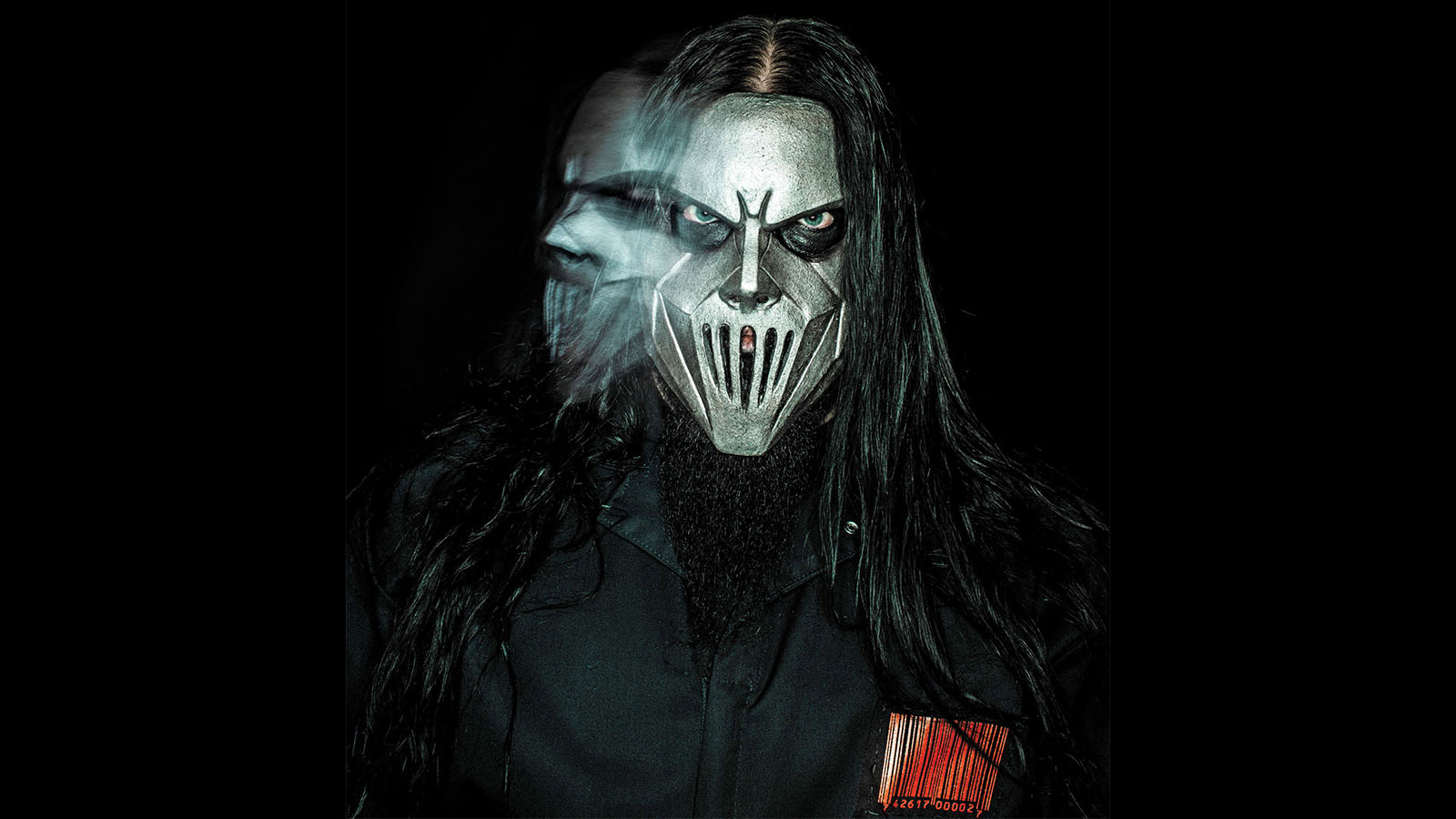
How did We Are Not Your Kind come together from a writing and recording perspective?
Jim Root: "This one was a little bit different for us. The whole process for this record took probably two and a half, maybe three years. I started putting riffs and ideas together when we were on the last album cycle, just in dressing rooms or whatever, on our Pro Tools rig. And then during the downtime when I was home I was working on arrangements.
"Clown and I were also talking about how this time we could really take the time to dive into the arrangements a little bit deeper and also come up with new things. So it was a little bit of a learning curve. I’m not sure we really approached it the right way, but I think we’re on a better path from the last record for sure."
We got to a point where we shut the click off entirely and just went for it... That was hugely important: it made us sound more like a band on record
Jim Root
Mick Thomson: "One cool thing about the longer time period for this one is that it gives you a longer vision. I’ve never understood when you see a band go into the studio and write for two weeks or something and then they put out a record. I’m like, “How do you know that you even liked that riff?” Because sometimes something seems kind of cool, but after you’ve played it a few times, you’re like, “Ehh… I don’t know.”
"But this time we were going into studios and working on these songs at different points, and then other new things were coming up to go along with what was already on tape. We had a longer time to live with everything and to decide how much we liked or didn’t like something."
Root: "Then when it was time to sit down and track the record we actually played as a band, which we didn’t really do on The Gray Chapter. That album was a little bit more 'built'.
"Because of the time constraints we had with that one, we kind of built everything off of the demos - we had Jay play to the demos and then we overdubbed over what he did. But this record, we would do 10 or so takes with clicks on at different tempos, and then we got to a point where we shut the click off entirely and just went for it, and did 10 or 15 more takes with no click. And that was hugely important: it made us sound more like a band on record."
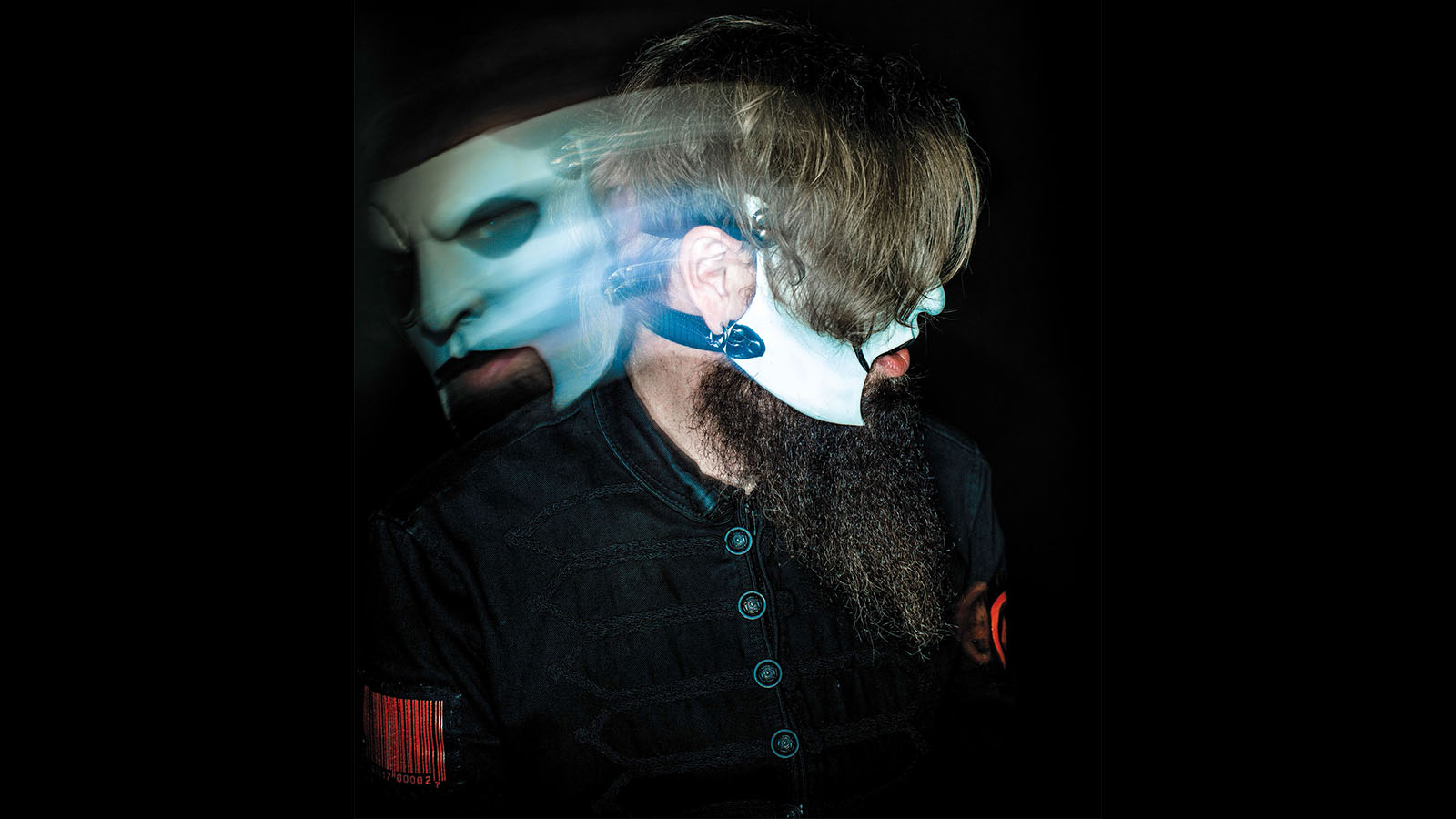
Back in October of last year, you released a standalone single, All Out Life. That song didn’t make it onto the new record; instead a line from the lyrics was lifted for the album title. What does the phrase "we are not your kind" signify to you?
Thomson: "Well, Corey writes all the lyrics, and they’re usually very specific to him. But as soon as I heard that line I was like, “There you go - there’s your fucking record title!” Because we’re not for all people, and we don’t really care.
"We do what we do for us, mostly, and the people who are into it are into it. But in all likelihood, we are not your kind. In all likelihood I’m not your kind. Like, if you got to know me, you’d go, 'Yeah… OK… no.' [Laughs] And it’s like, 'I could’ve told you that!'"
People are always telling us, 'You guys need to do another Iowa record.' And I just kinda sink a little bit when I hear that
Jim Root
Root: "For me, it’s kind of a tip back to something like the lyrics to Surfacing - 'Fuck it all, fuck this world, fuck everything that you stand for.' We do things the way we do them and we do them unashamedly. It’s our art. If you don’t like it, that’s fine. You don’t have to. You don’t have to come along for the ride."
In a recent interview Corey characterized the energy of the new album as something of a cross between your 1999 self-titled debut and the follow-up, 2001’s Iowa. What do you think?
Root: "That’s so hard to say. But I really hate comparing anything we do to anything we’ve done previously, because we’re not the same band we were when the first record came out - I wasn’t even in the band until the end of recording that record. I only did, like, three songs for the album.
"And Iowa, whether it’s on social media or whether it’s a fan that I talk to in the street, people are always telling us, 'You guys need to do another Iowa record.' And I just kinda sink a little bit when I hear that, because I’m like, you know, we were different people then, and it was a different band. We had a different set of values. We had a different hunger."
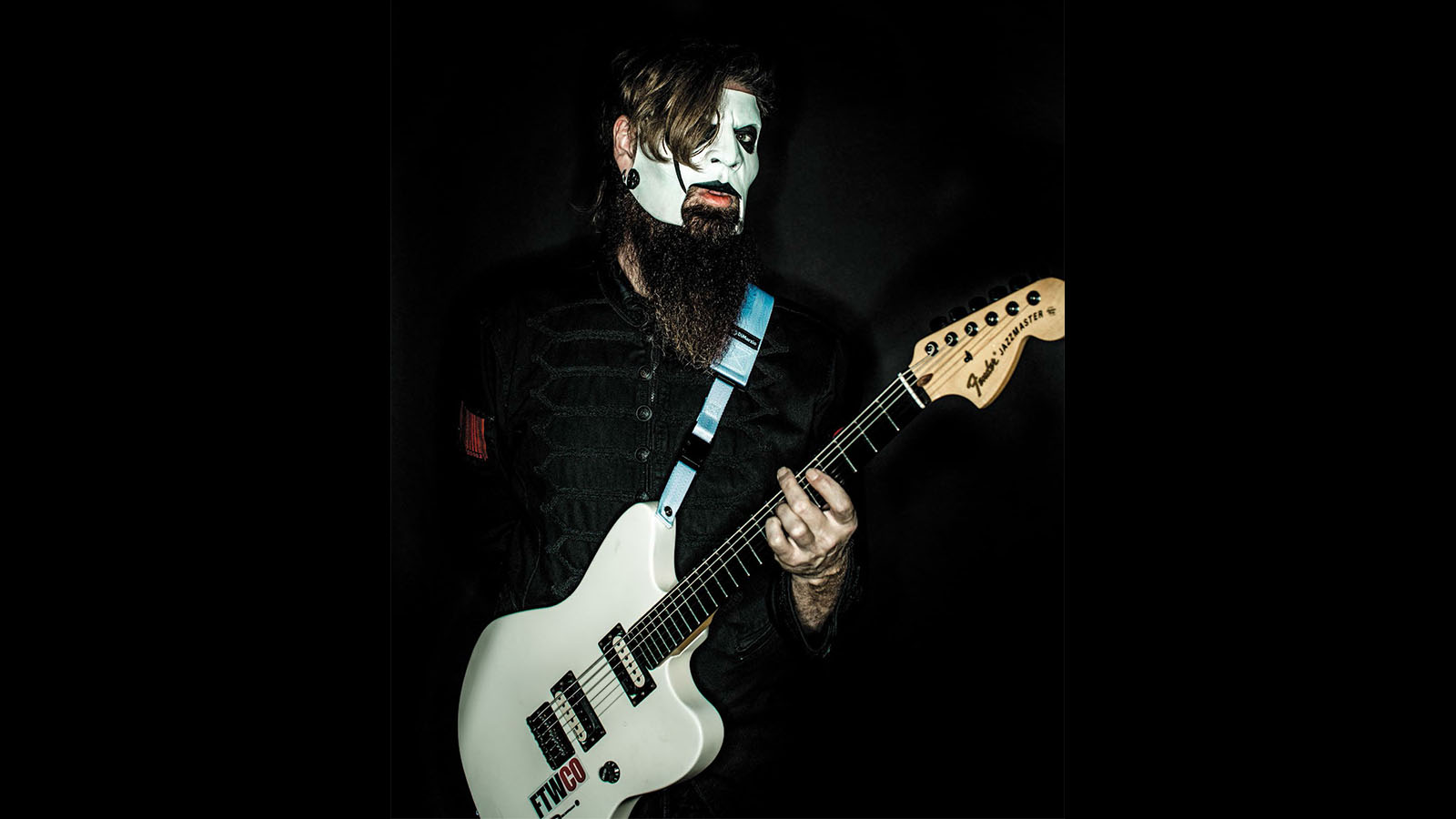
That said, do you feel those Slipknot and Iowa moments are present in the new album?
Thomson: "In some spots, but I wouldn’t go so far as to say it’s any kind of throwback to those two. This album is its own totally unique thing. But there are elements that would be reminiscent of the first couple of records, for sure - stuff that’s more aggressive and higher energy. But we also have a lot of songs that are - I wouldn’t necessarily say somber - but darker and slower.
"So it’s all things. Because we don’t try to conceive a record that’s going to fill a need. We just write what we write. And if it sounds good and we like it, we roll with it."
As far as the material on the new record, there’s definitely a wide range of styles. To pick just two tracks, you have a song like Nero Forte, which is arguably one of Slipknot’s catchiest, and then something like Spiders, which is extremely dark and impressionistic.
Spiders, man, I love that one. It’s like some weird, mid-'80s Bowie thing, and I got to do a cool Adrian Belew kind of outside-the-box guitar solo on it
Jim Root
Root: "It’s cool that you bring up those two, because those are actually songs that Clown wrote. [For] Nero Forte, he had drum cadences and beats and what he did was he sent all that stuff to Alex and he was like, 'Put notes to these, but don’t change the rhythm of it at all.' And then that song sort of built from there.
"And Spiders, man, I love that one. It’s like some weird, mid-'80s Bowie thing, and I got to do a cool Adrian Belew kind of outside-the-box guitar solo on it. I love doing stuff like that, that we haven’t done before."
Thomson: "As far as Spiders, we have sort of an experimental lab, which is kind of like a secondary studio setup. I usually refer to it as Clown World, but that’s an oversimplification. But it’s a studio with different percussion things and some guitars and basses, and a place where Craig and Sid have the ability to do anything they want to do. And Clown has lots of different synth modules and all this crazy noisemaking shit in there.
"There’s always some weird shit being recorded there, but in the past that 'weirder world' stuff might just turn into an intro for our set or something, as opposed to becoming a song that makes it onto the record. Whereas Spiders is something that is a little more of an evolved version of that weirder-world stuff. It’s fun to do stuff like that, where you go, 'Let me grab whatever random shit is in the room and see what kinds of sounds I can make with it.' That’s cool. But I don’t know that a Slipknot fan wants to hear an entire record of experimental weirdness."
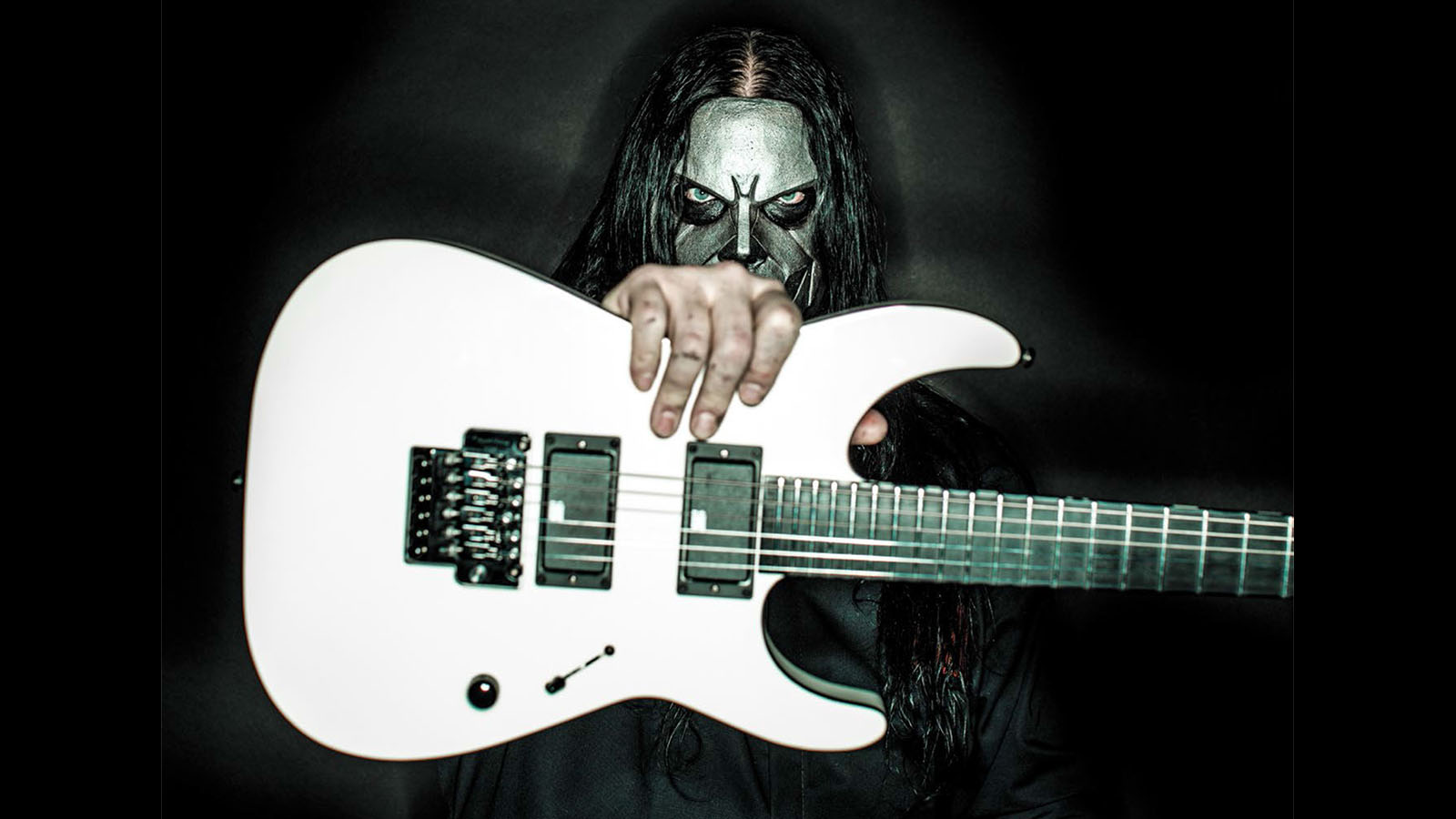
Could you talk a bit about the guitars and amps each of you used in the studio this time?
Thomson: "I’m playing new amps this time around - they’re made by a company called Omega. They’re currently kind of a small shop but hopefully they get the recognition they deserve and blow up into a fucking big shop. For the record and also for All Out Life, I used two Omega amps - a 100-watt Obsidian and a 100-watt Iridium prototype.
"The Iridium is a single-channel amp as of now, and the Obsidian is like a two-and-a-half [channel] - you’ve got clean and dirty, and then you can switch on a higher gain in the dirty channel. In the studio I was blending both amps, although live I’m just using one Obsidian, with a second one as a backup. They absolutely crush.
In one case it was the P90s going through a fuzz pedal into a Fender ’65 Super Reverb reissue. So there’s an amp you probably wouldn’t think you’d be hearing on a Slipknot album
Mick Thomson
"Then for guitars I used my signature Jackson Soloist models, and in some cases I switched out the pickups for Seymour Duncan P90s, just for a totally different kind of sound. In one case it was the P90s going through a fuzz pedal into a Fender ’65 Super Reverb reissue. So there’s an amp you probably wouldn’t think you’d be hearing on a Slipknot album."
Root: "I mainly used my signature Fender Jazzmaster - one straight off the rack that Fender sent me, no different to what anybody can pick up at a store, but I loaded it with my new signature set of EMGs that I have coming out.
"I had two or three different sets of pickup prototypes, and the third set of prototypes is the one I tracked the majority of the record with. The only time I didn’t use those pickups in that Jazzmaster was to track one or two songs where we were doing, like, third guitar overdubs and I used my [signature] Tele that has an [EMG] 81 and a 60 in it.
"Then for amps I had the brown Bogner Uberschall that I used on The Subliminal Verses [2004’s Vol. 3: (The Subliminal Verses)].
"Reinhold [Bogner] brought it to me when we were recording that album and it’s the only one like it. He kind of played around with the EQ section a bit and changed some of the parameters, and it sounds like an Uberschall on steroids. I’ve asked him to make me another one, but he doesn’t remember what he did the first time. But that amp is on about 70 per cent of the record.
"[For] the other 30 percent, I used another Bogner Uberschall with a 'purple mod' and combined it with an old Mesa Boogie Mark IIC head that I think has been on a bunch of Metallica records."
Let’s move on to another type of gear that’s pretty central to the Slipknot experience: your masks. The fans always look forward to you guys unveiling new designs at the start of each album cycle, but it’s stating the obvious to point out that the two of you, relative to some of your bandmates, tend to keep things pretty similar on the mask front from album to album.
Thomson: "I am who I am, you know what I mean? But my newest one is trying to get back to what my Vol. 3 one, the silver one, was. I kept that mask all the way up until the last record and it was just falling apart - the latex is all fucked up and shrinking and it’s just kind of shot. I only ever had two of them made, and I gave one away to a kid once. And so I just have the one.
"So I got with an artist this time and tried to recreate that mask. And it’s pretty close, but it’s not really going to change too much because I haven’t changed. I couldn’t imagine having anything else on and being out there onstage."
Root: "You know, I didn’t even start working on my mask until we were tracking the record. I was way more interested in the songwriting process and in putting these arrangements together. And because of that, that side of my part in the band kind of lacks a little bit.
"Some of the guys have these extravagant things going on - Sid’s outfit is insane for this record. It’s crazy. He’s got this mask that has all these moving parts and it’s on a remote control… it’s bananas. But for me, I kind of had to let that slide a little bit because I was in the studio and I’m answering questions, and then there’s mixes that are coming through and everything else. I couldn’t really attend to that part of it as deeply as I would’ve liked to.
"That’s part of the reason I just kind of let my mask evolve a little bit rather than drastically changing it every time. I just have to make sure the bottom is cut out so my beard can stick out. Stupid shit like that. [Laughs]"
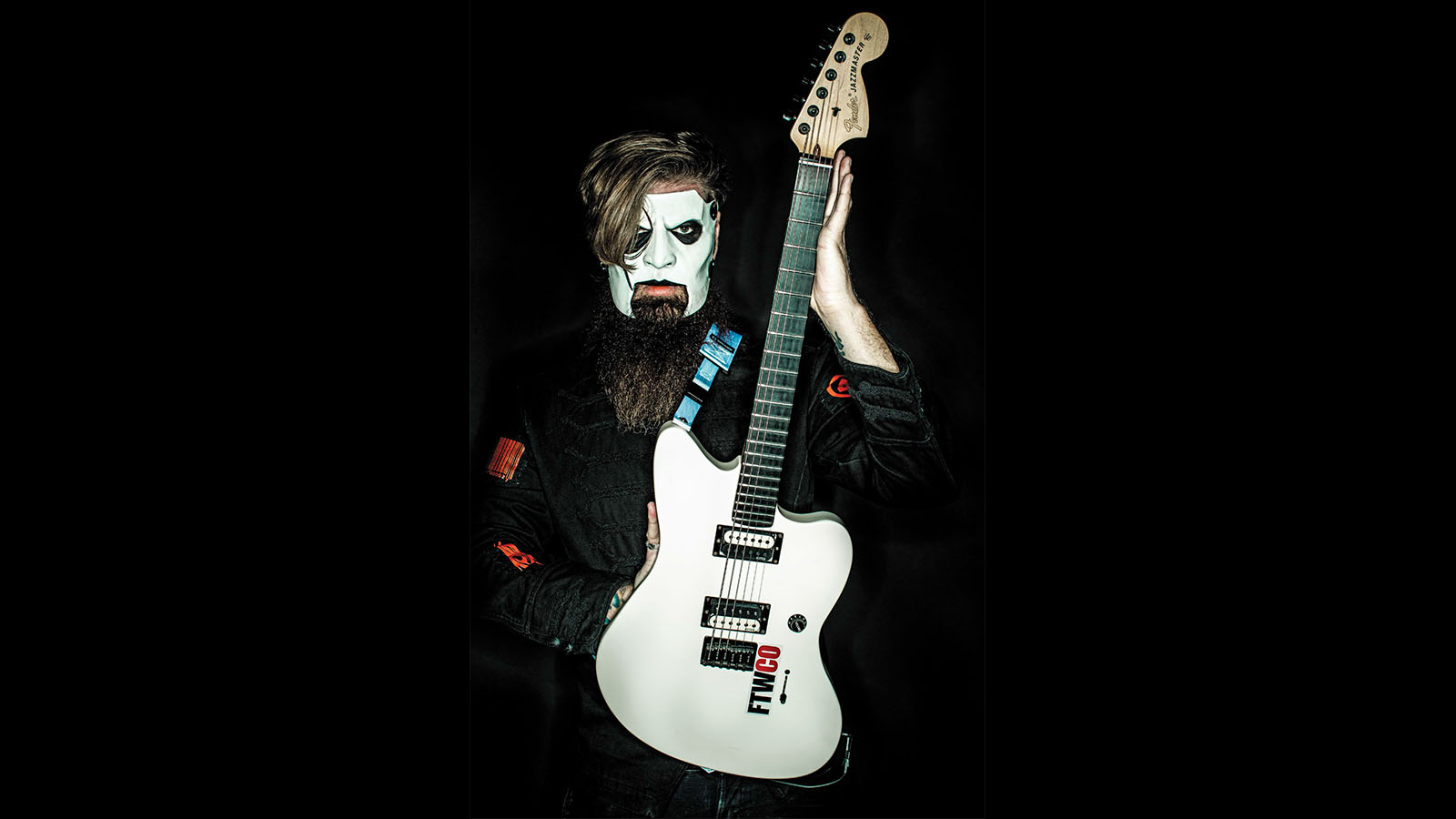
Speaking of being onstage, this year marks the 20th anniversary of your first-ever tour, which was as a second-stage act on the 1999 iteration of Ozzfest. What do you remember about that trek?
Root: "I remember there not being any laundry… I remember the band and the crew all on the same bus, and our bus stinking really bad. We would stuff our masks and our coveralls into all the cupboards and drawers, and it just fucking reeked. It was probably pretty unhealthy. [Laughs]"
Thomson: "First of all, we had a 40-foot bus, not a 45-foot bus, which is standard. So we lost five feet of movement, which, with that many motherfuckers on one bus, is humongous. So it was a nightmare. I mean, people sleeping on couches in the front, in the rear, everywhere.
"I had to lay flat in my bunk because if I rolled over, my shoulder would hit the bottom of the bunk above me. It was kind of like that Seinfeld episode where Kramer was renting out drawers in his fucking dresser for people to sleep in. That shit sucked!"
How about the actual shows?
They came up onstage with a dB meter and we were like, 128dB, and I think they had a 90dB sound limit or something! And the sound guys were asking, 'Can you be quieter?'
Jim Root
Root: "Honestly, the only thing I remember about those shows was soundcheck on that very first date. Before we even got, like, halfway into the first verse of a song, they stopped us. They’re like, 'Whoa, whoa, whoa, hold on… You guys on stage are louder than what we can have in the PA.'
"They came up onstage with a dB meter and we were like, 128dB, and I think they had a 90dB sound limit or something! And the sound guys were asking, 'Can you be quieter?' And it’s like, 'I don’t know - there’s three dudes hitting really loud drums right next to my fucking head!'
"Other than that, I remember it being really hot, and I remember throwing up a lot because, you know, we didn’t have any money, so we had to eat whenever we got a chance. And what we would eat was festival catering.
"So if your one chance to eat festival catering happened to be an hour before your set, well, guess what? Now it’s 90 degrees with 70 percent humidity in Texas and you just ate a bunch of food and you’re jumping around onstage like a moron. You’re gonna throw up! So it was a hell of a time. The only way you could do it is if you were hungry and wanted to take over the world!"
Thomson: "The shows were fun, but we were competitive. Always. My attitude was, 'I’m gonna win.' You know? 'I’m going to go out and I’m going to fucking destroy myself and leave everything I’ve got out there.' Because you’re young and hungry and angry. But I’m not bitching about it, because that was massive that we could even get on that festival for our first tour, because our record wasn’t even out yet [Slipknot's self-titled album was released roughly one month after the tour kickoff].
"And the rules were you had to have a record out. There was a lot of buzz when people started hearing some demo stuff and pre-release shit, so that helped, but Sharon [Osbourne] had to sign off on us being there. And that was amazing that she did. So we were fucking really lucky that we were able to get on that thing. And who knows what would have been different for us had we not been on that tour at that time."
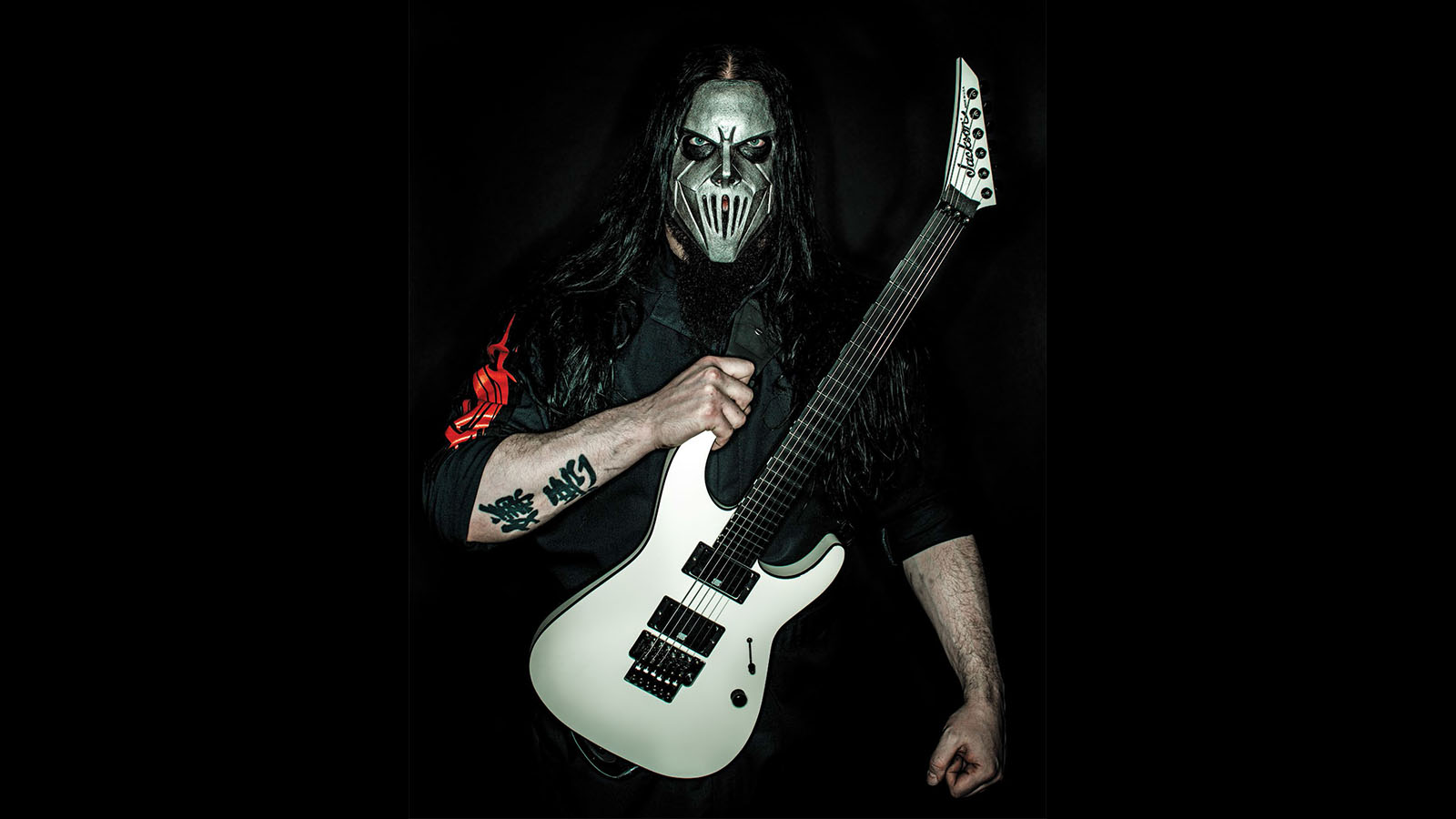
And now here you are 20 years later and you have your own festival, Knotfest, as well as the current scaled-down touring version of it, the Knotfest Roadshow.
Thomson: "I could never have predicted that we could get to do what we do, and also be successful. From the outset I thought that if we got our first record out, then maybe we’d be able to do a second one, but we probably weren’t going to appeal to a lot of people outside of that. But, you know, I guess I was wrong."
Root: "It’s weird and it’s awesome. But for me, at least, I can’t look at any of it objectively and I don’t really understand what it’s become. It’s too hard for me to wrap my brain around it.
"It’s like if you’re gonna grow your hair out long, you don’t really realize how long it’s getting because you see yourself every day. But then somebody that hasn’t seen you for a year or so comes up and they’re like, 'Holy shit! Your hair’s gotten really long!' - 'Oh fuck, yeah, I guess it has. I didn’t realize!' That’s kinda how I am with our career. To me, I feel like we’re still working toward a goal. There’s still a lot more to come."
We Are Not Your Kind is out now via Roadrunner Records.
Rich is the co-author of the best-selling Nöthin' But a Good Time: The Uncensored History of the '80s Hard Rock Explosion. He is also a recording and performing musician, and a former editor of Guitar World magazine and executive editor of Guitar Aficionado magazine. He has authored several additional books, among them Kurt Cobain: Montage of Heck, the companion to the documentary of the same name.
![Slipknot - Unsainted [OFFICIAL VIDEO] - YouTube](https://img.youtube.com/vi/VpATBBRajP8/maxresdefault.jpg)
![Slipknot - Solway Firth [OFFICIAL VIDEO] - YouTube](https://img.youtube.com/vi/V3ADK6gsDGg/maxresdefault.jpg)
